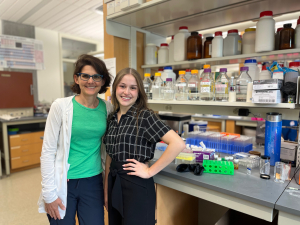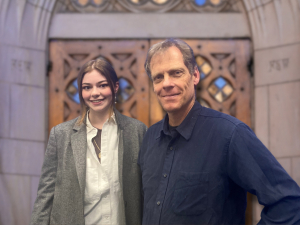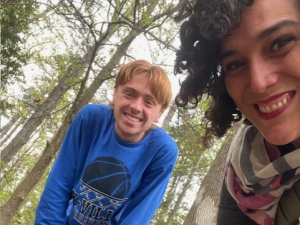
Research Is Never Really Finished
Mathematics and Biology professor Veronica Ciocanel and student Daniel Block (T’24) discuss their shared experience of being math students at Duke, what it means to let go of a project’s ownership and how to use the scientific method to investigate the existence of the Tooth Fairy.
Related links:
The Ciocanel Group
Math 183: Biological Clocks: How Organisms Keep Time
Math+
Full Transcript
Welcome to Duets, a podcast exploring the human side of research collaborations between Duke faculty and undergraduate students.
Today we're joined by faculty member Veronica Ciocanel and student Daniel Block, whose collaborative research is grounded in mathematical modeling and simulation of cell and developmental biology processes.
Veronica: My name is Veronica Ciocanel. I am a faculty member in the Math department, but I have a joint appointment in Biology. My research interests are in mathematical biology. I am inspired by questions in cell and developmental biology, and I use techniques from applied mathematics to model biological systems and understand things that experimental biologist can't quite get it with purely experimental techniques.
Daniel: I'm Daniel Block. I am majoring in Mathematics, Computer Science and a minor in Medieval and Renaissance Studies. My interests in the math department come from mathematical modeling, particularly using stochastic modeling aspects from probability and data science components as well.
Veronica: Daniel, I'm curious if there's a story, maybe from your childhood, that your family or friends often tell about you?
Daniel: When I was much younger, maybe second grade, I learned about the scientific method. And one primary question I had about the natural world was whether or not the Tooth Fairy really existed.
Veronica: Fair question.
Daniel: Yup. I had been hearing competing claims from my parents, from my friends. So, I thought, why not use the scientific method to make my own conclusion. I proceeded for six days to keep my tooth under the pillow but not tell my parents. The seventh day, I told my parents that I had lost a tooth, and I also set up a tripwire that would turn on the lights when they entered. And only after I told them that I had lost the tooth did the lights turn on and the tripwire would go off. So, I learned that in order for the Tooth Fairy to come, you need to tell your parents.
Veronica: Excellent. I love the early application of the scientific method.
Daniel: Professor Ciocanel, I was wondering if there's an important lesson that you've learned over your career as a Duke faculty member, and even maybe when you were a Duke student?
Veronica: I was a Duke undergrad, so I definitely learned a lot as a student. I learned that research is a thing. Basically, the work I did here inspired me to do a Ph.D. and become a professor. I would say, as a faculty, what I've learned is, I have had to let go a little bit of the ownership of some of my research projects. And here's what I mean by that — I was used to, before, being the main person designing the research, coming up with the mathematical model, doing the analysis, maybe doing simulations, connecting with the collaborators. And the — both challenging and exciting — thing that you do when you become a faculty member is you start working with people. You work with undergraduate students, very talented ones like yourself, with graduate students, with postdocs, and they become in charge of their directions. And that at times is scary because I was used to having my handle on every aspect. But it's also kind of freeing, after a while, to be able to look at the big picture and think about what we could do more globally with our research and where we can put our contributions. That has been a lesson to learn for me, but it's been a wonderful process.
I'm curious how collaboration has come up in things that you've done at Duke as a student?
Daniel: Specifically, in the research that we've done, there is a lot of collaboration with medical school, especially in collecting the data that we then use for our mathematical models. I have gone back and forth with postdocs and Ph.D. students that are doing the physical research, fluorescing these proteins that I'm using to create the models based off of. I do really appreciate the back-and-forth of talking to them, understanding their research process and in return, they're chatting with me and understanding my research process — and it's a good way to build up new skills. Also, a big aspect of collaboration that I was really grateful for is our monthly math-biology meetings where we got together with faculty members, some postdocs, Ph.D. students that are also working on math-biology projects. We each got two, maybe five/10-minute presentations on research updates. I've really appreciated learning about other people's research and it has given me a group of individuals that I know I can reach out to if I need anything. Having people around willing to help was really, really nice.
Veronica: That’s wonderful to hear.
Daniel: As an undergrad, I don't fully feel like my own researcher yet. So, I want to ask you when's the first time you truly felt like a mathematician?
Veronica: I think I started feeling, maybe, like being a mathematician is in my future sometime in undergrad because my advisor recommended that we publish my senior thesis in an undergraduate research journal. And so, going through that process makes you feel a little bit like you have to be a professional to deal with submitting and publishing a paper. So, that's one of the first times that it felt like being a mathematician, maybe in academia, could be something that I enjoy.
I'm curious how being a student at Duke has felt different than what you anticipated.
Daniel: I think the Math major is more than just simply taking classes. Perhaps when I got to Duke that's what I thought it would be, but it definitely is a community of students working together. But there's so much beyond just the academics, things like — your social experience, or forming strong connections that you're going to keep once you graduate. I think it took a lot more effort on my part to build a full life. I think now, especially as a senior looking back, there's so many aspects that go into, like, being who I am and being a successful Duke student, and it just requires a lot more work than I anticipated.
Veronica: I could see that. I was an international student at Duke, and I think I didn't anticipate how much that would provide a community for me. I didn't quite understand how much the cultural aspects of people coming from different countries and contributing to this campus would shape my view of the campus and what I ended up doing — things like participating in Food Fest, cooking some Romanian dishes and things like that. And, like you said, that takes time, that takes effort to have the people around you to support you in those activities and to give you that community.
Daniel: Professor Ciocanel, when is the time in your research process that you felt hopeful?
Veronica: I'm grateful to feel hopeful a lot when I do my research, I enjoy it a lot. In one project right now, we're looking at understanding the transport of biopolymers inside neurons, which you know about, microtubules. And how their dynamics inside of neurons and they’re organized in very specific ways, but it turns out that when the axon of a neuron is injured, then there's a process of regeneration that can happen and that can lead to very different dynamics of those microtubule tracks. And so, what I find quite hopeful is that we have now a stochastic mathematical modeling framework that allows us to understand what happens in healthy settings when things are organized the way they should be inside the neuron. And I'm excited to see what will happen when we change some of those feedbacks that come from injury of the neuron, and whether our mathematical modeling work can predict what kind of mechanisms change in the regeneration process. So that gives me kind of this scientific hope of connecting — definitely further down the line — to understanding things like neurodegenerative diseases and what are the mechanisms behind those.
Daniel: As you were talking about microtubules and future work on the project, I think, definitely in our research, there is a future analyzing the microtubule structures inside these neurons. I think that is a hopeful prospect for where my research could go. It's definitely a nice feeling to see ways to improve it, still see ways to build on it. I guess a project is never really finished, but —
Veronica: I guess that's something you learned about research: it's never finished, but it's still rewarding.
To learn more about my research, you can look up the Ciocanel Group online. I would like to highlight a course cross-listed between math and biology that's on biological clocks and how we can use mathematical modeling to understand oscillations in different protein levels and gene expression levels.
Daniel: After my time at Duke, I definitely still hope to keep learning math, keep studying math and maybe even make some new math.
Senior Editor and Producer: Cara August, Trinity Communications
Audio Editor and Mixer: Marc Maximov
Music Composition: Grace Davis, T’26
Production Sponsor: Trinity College of Arts & Sciences, Duke University
Recording Date and Location: April 2024, Bryan Center Studios
Duets is produced by Trinity College of Arts and Sciences at Duke University.



